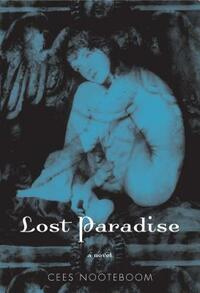You need to sign in or sign up before continuing.
Take a photo of a barcode or cover
I’m not quite sure how I feel about Cees Nooteboom’s Lost Paradise, which is split into two seemingly unconnected parts that eventually come together in a not particularly convincing way.
Nooteboom is a Dutch writer with a hefty body of work, spanning poetry to travel writing, to his name, as well as a slew of literary awards. Lost Paradise, his 12th novel, was first published in 2004 and translated into English in 2007.
Unusually (for a Dutch writer), the story is largely set in Australia.
The first part focuses on two young Brazilian women, (the confusingly named) Alma and Almut, who are obsessed with Aboriginal Australians. They travel to Australia to learn about this ancient culture and to make their dream of visiting the “Aboriginal Sickness Dreaming Place” come true.
Toward the end of their journey, which takes in Adelaide and Alice Springs (among other places), they arrive in Perth, where they take part in an international arts festival event called The Angel Project. (This, apparently, was a real art installation, staged across 13 sites for the Perth International Festival of the Arts in 2000. It has also been held in London and New York.) Here, they are required to dress as angels and remain as still as statues in places dotted around the city.
The second part is about a middle-aged literary critic, Erik Zondag, who travels from Amsterdam to Austria to stay at a remote spa resort on the advice of his girlfriend who wants him to return a changed man. While there he encounters a woman with whom he once spent the night in Perth many years earlier, a woman he still occasionally thinks about, a woman who was, at the time, dressed as an angel.
And hence, you have the unlikely connection between these two seemingly disparate halves of the one book.
To read the rest of my review, please visit my blog.
Nooteboom is a Dutch writer with a hefty body of work, spanning poetry to travel writing, to his name, as well as a slew of literary awards. Lost Paradise, his 12th novel, was first published in 2004 and translated into English in 2007.
Unusually (for a Dutch writer), the story is largely set in Australia.
The first part focuses on two young Brazilian women, (the confusingly named) Alma and Almut, who are obsessed with Aboriginal Australians. They travel to Australia to learn about this ancient culture and to make their dream of visiting the “Aboriginal Sickness Dreaming Place” come true.
Toward the end of their journey, which takes in Adelaide and Alice Springs (among other places), they arrive in Perth, where they take part in an international arts festival event called The Angel Project. (This, apparently, was a real art installation, staged across 13 sites for the Perth International Festival of the Arts in 2000. It has also been held in London and New York.) Here, they are required to dress as angels and remain as still as statues in places dotted around the city.
The second part is about a middle-aged literary critic, Erik Zondag, who travels from Amsterdam to Austria to stay at a remote spa resort on the advice of his girlfriend who wants him to return a changed man. While there he encounters a woman with whom he once spent the night in Perth many years earlier, a woman he still occasionally thinks about, a woman who was, at the time, dressed as an angel.
And hence, you have the unlikely connection between these two seemingly disparate halves of the one book.
To read the rest of my review, please visit my blog.
Like an angel, this book flew right over my head.
It's a svelte little thing, just 150 pages, and the prologue got my hopes up, all metatextual and clever. But the real meat of the story, what little there is, falls flat to me. Neither character is particularly vivid, their inner conflicts are vague and confused—which is realistic, true to life, but not very interesting to read about.
Nooteboom's prose is that fine stuff you'll find in literary fiction which, in its most concentrated moments, reaches either utter genius or insane pretension.
Take this passage:
Sparse but beautifully constructed, there's no fat. Using simple action sentences, we perfectly understand the sense of both modern ignorance and ancient, natural menace. It's great.
Now let's take a look at this one.
By contrast, this passage is unclear, ridiculous, and eyeroll-inducing. These are supposed to be the thoughts of a woman in her twenties, and yet I feel for all the world as though I'm lying in bed after an ill-advised fling with my English professor and enduring a navel-gazing soliloquy on "pornography of the mind." I mean, good god.
This dovetails with the whiffs I got of "men writing women syndrome," as when Nooteboom took a moment to describe the pert breasts of a passenger on an airplane and then in the next chapter wrote about a woman being raped in a Brazilian slum; it's hard to put your finger on why these things are so jarring sometimes, but the only explanation I can give is that his treatment of women feels uniquely short-sighted, as though they are not real people or, if they are, their inner lives are surely dominated by thoughts and feelings about men.
I like some of the ideas Nooteboom plays with but frankly I think they're done much better elsewhere, like Angels in America or Revolt of the Angels, which also take them much further.
____________________
Global Challenge: Netherlands
It's a svelte little thing, just 150 pages, and the prologue got my hopes up, all metatextual and clever. But the real meat of the story, what little there is, falls flat to me. Neither character is particularly vivid, their inner conflicts are vague and confused—which is realistic, true to life, but not very interesting to read about.
Nooteboom's prose is that fine stuff you'll find in literary fiction which, in its most concentrated moments, reaches either utter genius or insane pretension.
Take this passage:
No lowlander can sleep with impunity in the mountains. The window, which has been left slightly ajar, lets in the cold night air. The man in the bed works his way through a series of dreams, none of which he will remember. In the silence, which he does not notice, an owl hunts its prey and a startled deer plunges into the black syntax of the forest, where Erik Zondag will take a walk tomorrow without identifying the deer's track's. When he wakes, he will see a snowy mountain range lit by the first rays of the sun—a row of sharp, gleaming-white teeth, daubed here and there with blood.
Sparse but beautifully constructed, there's no fat. Using simple action sentences, we perfectly understand the sense of both modern ignorance and ancient, natural menace. It's great.
Now let's take a look at this one.
Is there such a thing as pornography without the porn? Simply an idea in your head, without a graphic image? Pure pornography of the mind, or of a situation, in which a lie changes every move, kiss, caress and climax into something else, something obscene and perverse? I think about this, and yet at the same time I lie here and wait for him to utter one of his infrequent words, for him to touch me again and make me forget my thoughts.
By contrast, this passage is unclear, ridiculous, and eyeroll-inducing. These are supposed to be the thoughts of a woman in her twenties, and yet I feel for all the world as though I'm lying in bed after an ill-advised fling with my English professor and enduring a navel-gazing soliloquy on "pornography of the mind." I mean, good god.
This dovetails with the whiffs I got of "men writing women syndrome," as when Nooteboom took a moment to describe the pert breasts of a passenger on an airplane and then in the next chapter wrote about a woman being raped in a Brazilian slum; it's hard to put your finger on why these things are so jarring sometimes, but the only explanation I can give is that his treatment of women feels uniquely short-sighted, as though they are not real people or, if they are, their inner lives are surely dominated by thoughts and feelings about men.
I like some of the ideas Nooteboom plays with but frankly I think they're done much better elsewhere, like Angels in America or Revolt of the Angels, which also take them much further.
____________________
Global Challenge: Netherlands
Nooteboom is a favorite of A.S. Byatt's. Interesting.
Tamelijk goed geschreven, maar zeer dun verhaaltje. Kapstok om te mijmeren over de aboriginals.

Charming. Dreamy. Beautiful.
Lost Paradise - Dutch author Cees Nooteboom's enchanting short novel about a young lady and an older man and their crossing paths – twice.
I find a special appeal when novels feature multiple narrators, or what I term rotating first person. Lost Paradise has two narrators: Alma from São Paulo and Erik Zontag from Amsterdam. Actually, make that three if we include the narrator of the book's Prologue and Epilogue.
In the spirit of a trailer for a film, here's my own rendition of what could be a Lost Paradise trailer:
PROLOGUE
The narrator, lets call him Cees, waits for the last passenger to board, perhaps the smallest airplane he's ever been on. Ah, Cees is in for a treat. The passenger turns out to be a woman, “the kind of woman you hope will be seated next to you.” And Cees sees she's been assigned a window seat in the row ahead of him, on the left hand side, a seat where he can look at her as much as he wants. This young woman with long legs in khaki trousers opens a slim book but, darn, she's holding the book in such a way he can't read the title. Cees, an author himself, is forever curious about what books people are reading.
PART ONE
“Someone drove down the Marginal, along the Tietê, past the nouveau riche houses in Morumbi, and then, without giving a thought to where she was going or what she was doing, entered forbidden territory – not Ebú-Ecú, but Paraisópolis, the very worst favela of all, a hell rather than a paradise, and fraught with danger, making it, at that moment, irresistible.” That someone is Alma and she's talking about herself in the third person for a very specific reason: her car broke down in the favela and she was gang raped.
As a way of attempting to cope with her trauma, Alma is off to the Australian outback with her lifelong friend, Almut, a cheeky, sexy gal who always had her walls back home in São Paulo covered with reproductions of Willem de Kooning and Jean Dubuffet. Like Almut, Alma planned to study art history in college, but, unlike her friend, her fascination was not with modern art but the art of the Renaissance. Alma covered her walls with angels.
Alma and Almut read about the Aboriginal Dreamtime, and Almut came across something called the Sickness Dreaming Place. Alma became fascinated and desperately desired to visit this Sickness Dreaming Place. At one point, the friends split up, with Alma encountering an Aboriginal artist and his art. She lived with him for a while and also ventured out to the desert with him. Once back together, in order to acquire a skill to make money, the Brazilian gals took classes in physical therapy and massage.
Just when their funds are about to run out, Almut lets Alma know they can drive to Perth and make good money by taking part in a piece of performance art where they'll be dressed up as angles. “They give us a pair of wings and every day for a week someone picks us up and takes us to a hiding place in a church, or in a ruin, or in a bank. We just have to say put all day and let people find us. Somehow it's all related to Paradise Lost.” So they're off. And, as an angel, Alma has an encounter with an older man that proves moving and profound – for them both.
PART TWO
Erik Zontag is pushing fifty, a Dutch literary critic for a newspaper. His scathing review of the latest novel by one of his country's literary giants arrives on his doorstep that very morning. His girlfriend, Anja, eighteen years his junior and herself an art critic for a rival newspaper, accuses Zontag of writing an unfair review. No matter; this morning he's off from Amsterdam to an exclusive spa in the Austrian mountains.
Eric had mixed emotions about spending a week at a spa specializing in weight loss, but after five days he's feeling positively rejuvenated. Then it happens. He receives a note upon returning from his morning hike telling him the woman who has been given him a massage had a minor accident and someone else will be taking her place. Eric goes to meet her. "They have met before - that much is clear. What no one can see, however, are the wings he mentally attaches to her back, the wings of an angel he has never been able to forget."
EPILOGUE
Cees' plane has landed and he's now taking trains to his final destination. At one of the stations, he spots the woman. “She is wearing the same outfit she had on the plane and is carrying the same book – the book I thought I had written, the book I still have not been able to shake off." Cees summons the courage to speak to her, asks her for her opinion of the book. As to what book this attractive lass has been reading and what she has to say...for each reader to discover. But I'll give a hint. This epilogue mirrors the tale of Alma and Zontage.
Thank you, Cees Nooteboom, for this splendid novel.

Dutch author Cess Nooteboom, born 1933
“I am the equal of the stillness, the sand, the starry sky”
Wow. A dreamy, enchanting, hypnotic take on how seemingly fleeting moments of our lives can drastically alter the path we take, the choices we make, the people we meet, and where we end up.
There is so much here that I will hold close to my heart and think about for years to come. A new favorite of mine.
Wow. A dreamy, enchanting, hypnotic take on how seemingly fleeting moments of our lives can drastically alter the path we take, the choices we make, the people we meet, and where we end up.
There is so much here that I will hold close to my heart and think about for years to come. A new favorite of mine.
(2,5) I feel that even though Cees Nooteboom's style in all of its density and endless references excites me, it can also be a bit too full of itself to make for an enjoyable read. This at least is how I perceived Paradise Lost, a novel about a Brazilian woman and a Dutch man who meet each other once in a highly unusual setting and their subsequent meeting a couple of years later. The book is divided into two parts - the first one focusing on the woman's point of view and the second on the man's - each of them giving insight into their respective struggles as wandering souls on earth who in some way have been driven from paradise and are trying to find it again, potentially in each other. There are plenty of interesting passages to be found here but, as noted before, Nooteboom's style often takes the overhand and becomes too poetic and overwhelming to keep track of the story that's hidden somewhere beneath it. The first half is, in this regard, much more difficult to read than the second. Overall definitely not my favorite of Nooteboom's writing though I do see the appeal in certain parts.
Wunderschön, poetisch und magisch geschrieben, aber irgendwas an der Geschichte gibt mir ein Gefühl von dem ich noch nicht sagen kann ob es positiv oder negativ ist. Ich glaube ich muss es irgendwann nochmal lesen
Excellent.
It put me in a very quiet mood. I like books that do that. It also reminded me of a favourite film: Chungking Express by Wong Kar Wai. There was a similarity of mood and I suppose because the complete work was composed of two parts tangentially related.
It put me in a very quiet mood. I like books that do that. It also reminded me of a favourite film: Chungking Express by Wong Kar Wai. There was a similarity of mood and I suppose because the complete work was composed of two parts tangentially related.





